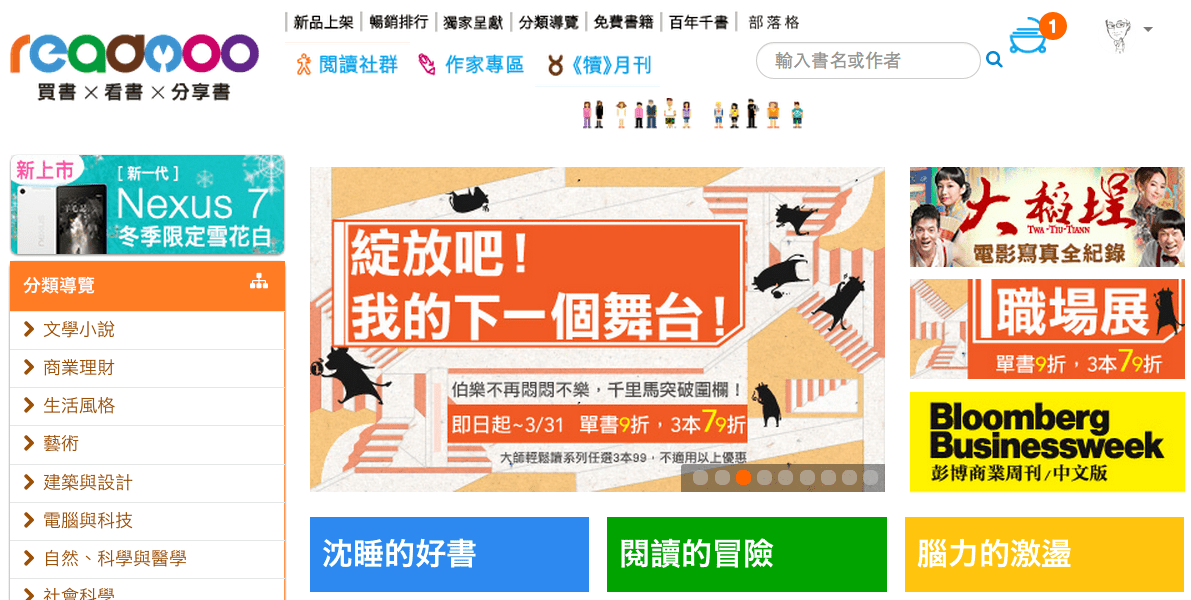Readmoo Aims for Easy, Breezy E-Book Experiences
Translated from: 台灣:Readmoo 不只要打開電子書市場,更要讓電子書產業提升
Do you still read books other than Facebook? Reading habits have encountered significant challenges now in Taiwan. Mobile devices pose both threats and opportunities. Although contents proliferate online, it still carries another layer of meaning when compiled into books, digital or print alike. Many people have started, myself included, to read novels, magazines and comics with these devices. Admittedly, most contents have copyright issues, and our choices for original e-books in Taiwan are very limited. Readmoo is an important local player for e-book startups, so I talk to co-founders Wenchen Pang (龐文真) and Wanfang He (何宛芳) about their works and prospects.
—–
What has Readmoo done in 2013?
Pang: We work with more than 250 publishers now. It marks a change that publishers and some writers in Taiwan have shifted from resisting, accepting to embracing e-books. We recently persuade experienced write Aiya (愛亞) to publish in this form, although she admits at Taipei International Book Exhibition (TIBE) that reading without paper feels like leaving home barefoot. Comma Books released free e-book version for marketing before their paper book was published last year.
He: You can also find more details in 2013 Readmoo Annual Report.
What’s more challenging to you among technology, license and more users? What obstacles do you need to overcome?
Pang: They are all challenges, and all related to reading, buying and sharing books.
Technically, we hope people can read in a easy, breezy and painless way, so we choose browser interface, widely applicable to many devices. In such a case, readers do not have to purchase designated hardware or another application, and we can focus more on branding.
Browser interfaces bring us other challenges, though. For example, how to underline favorite sentences and read offline. There are so many technical challenges to talk about, but we are dealing with them one by one.
For buying books, of course we need to get more licenses. We receive emails from readers every single day asking for specific titles. Even if we already have a lot of new books, we need more.
We definitely want more readers, but we also hope they’ll share. It’s not easy to building sharing culture, as readers tend to keep their favorite pieces themselves. We have made plans to increase users, and hopefully great books will go viral like YouTube videos.
Your approach is obviously different from other e-reading platforms. Why don’t they use browsers at the beginning?
Pang: Browser is a difficult choice! IE is a huge challenge, so we basically give up on those users, although in large numbers. We are often asked, “What is your application?”. I think we have chosen the most difficult one to start with. There’s no full HTML5 and responsive e-book website in Taiwan that focuses on epub at the same time. That’s why we have limited titles initially. We’ve paid a lot of efforts to develop and to persuade, and tried to attract users with various strategies.
What are your main projects this year?
Pang: Our priority is the new Android and iOS application, so readers can build an immersive experience with their own devices. This responds to what readers have asked for. We will also have major innovations on community reading in the next six months.
What have you noticed about e-book readers in Taiwan via Readmoo?
Pang: You can find more details in our annual report. I just want to emphasize that offline reading is required for commuters is all because of insufficient internet infrastructure. We don’t even have LTE. Payment and invoice issues affect local development as well.
When readers buy books, we need to give them invoices. As a startup, we are not qualified to use e-invoices yet. Isn’t that pure craziness to send invoices by snail mail for e-books? That’s what we do now.
Will you try third-party payment services?
Pang: We’ll try when it begins in Taiwan. We connected with ATMs since late last year, and started kiosk payment at convenient stores before Chinese New Year, which bring us more students, but it’s still not intuitive that you can’t have books right way. Customers also complain when ATMs went wrong during CNY. These channels are barely profitable for us so far with high transaction costs. We keep them just to attract more readers.
Will you continue on fundraising?
Pang: After twice, we have NT$150 million (US$5 million) in capital. People encourage us a lot during TIBE, but they also mention “it takes five to eight years for a cultural business to be sustainable.” We are contacted by venture capital right after the event. We welcome more capital, but we’ll do it more carefully.
—–
As it’s still nascent in Taiwan, Readmoo and other e-book startups need to further expand the market. With comparatively larger capital, Readmoo is the only e-book platform that organizes offline meetups. By having seminars on digital publishing for two years in a row in TIBE, they attempt connect online and offline readers, as well as increase public awareness on this area. Guest columns in their blog serve the same objective. “We are eager to hear more from other experimental teams, present our views and raise our voices,” says Pang.
While startups like Readmoo try to attract readers, digital publishers are not fully recognized so far in the e-book industry in Taiwan. It’s too costly for content owners, publishers and writers alike, to contact individual e-book platform, so software platforms or intermediary players are now available now in USA and Japan, for example, to minimize the hassle. Vendors like Puomo or Wanderer, although still small in scale, are important factors to this ecosystem in Taiwan.
Translated from: 台灣:Readmoo 不只要打開電子書市場,更要讓電子書產業提升
2013年度報告,取自 Readmoo電子書店










留言討論